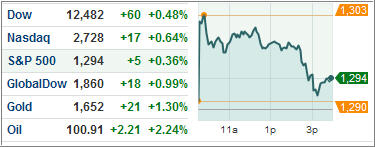Last week’s downgrades were forgotten as markets edged up today, with the S&P 500 gaining 0.36%. The optimism was seen across global indices while gold and oil prices pushed higher.
While global markets and commodities didn’t account for Europe’s troubles, the 10-year Treasury stood still at 1.85%. In the context of bond markets, investors continue to seek safer havens to store their assets, indicating perception of greater risk.
Elevated risk was seen in the form of the VIX, which rose 6.17% after a few weeks of relative inactivity. In essence, there’s still a lot of volatility in the market that can’t be ignored.
This week will be crucial in relation to Greece’s fate and whether or not it can convince bondholders to take a 50% haircut. The troika will be in Athens to analyze Greece’s situation and whether it can persist in the Eurozone. As I’ve previously said, Greece has no business staying in the Eurozone. Any reforms implemented are simply too little too late as the contagion has already spread. A new future back on the drachma needs to be embraced.
Interestingly, Friday’s S&P downgrades haven’t had much of an effect on borrowing costs. For instance, Spain’s bond auction today resulted in lower yields despite a 2 notch downgrade while France’s yields have barely budged. If there’s any plus side, the S&P warnings toward the end of last year minimized any potential surprises that could’ve spooked markets and added significant volatility.
The EFSF was also downgraded yesterday, losing its AAA status. Yet, this didn’t appear to have much of an effect given that most European leaders agree that the EFSF lacks the necessary financial firepower to act as an effective bailout fund.
Amidst talks that China’s slowing down, its Q4 GDP figure supports that statement as its quarterly GDP growth hit its lowest level since 2009. China’s inability to spur domestic demand via consumption in order to offset decreases in exports is something it must overcome if it wants steady growth.
Despite some of the negativity we’ve seen in Europe as well as cracks surfacing in Asia, markets don’t really seem to mind. Perhaps there’s an expectation that there’s a long-term solution looming in Europe and that Greece will come to a resolution.
However, I still believe the marketplace is quite risky, thus warranting a cautious approach to equity ETF exposure. What that means is that you need to have your sell stop discipline in place should the downside suddenly come into play in a big way.
Contact Ulli
